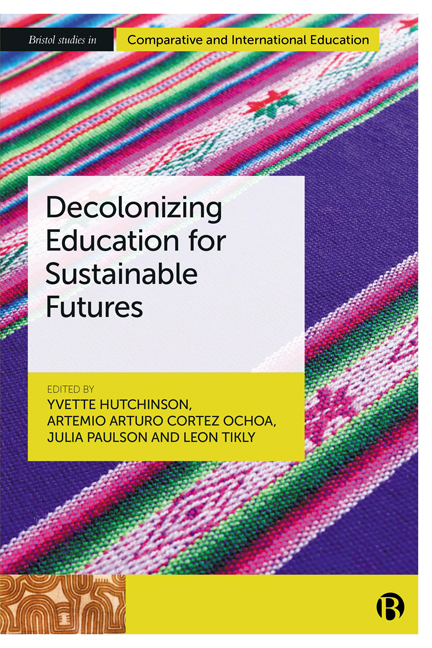Book contents
- Frontmatter
- Contents
- Series Editor Preface
- List of Figures and Table
- List of Abbreviations
- Notes on Contributors
- Acknowledgements
- Introduction
- PART I Connecting Decolonial and Sustainable Futures in Education
- PART II Decolonizing Education for Sustainable Futures: From Theory to Practice
- PART III Education’s Reparative Possibilities: Responsibilities and Reckonings for Sustainable Futures
- Conclusion
- Afterword
- Index
1 - Decolonizing Education for Sustainable Futures: Some Conceptual Starting Points
Published online by Cambridge University Press: 18 January 2024
- Frontmatter
- Contents
- Series Editor Preface
- List of Figures and Table
- List of Abbreviations
- Notes on Contributors
- Acknowledgements
- Introduction
- PART I Connecting Decolonial and Sustainable Futures in Education
- PART II Decolonizing Education for Sustainable Futures: From Theory to Practice
- PART III Education’s Reparative Possibilities: Responsibilities and Reckonings for Sustainable Futures
- Conclusion
- Afterword
- Index
Summary
Introduction
As the recent report of the International Commission on the Futures of Education argues (see ICFE, 2021, pp 7– 8), anticipating education futures has profound implications for the present:
Anticipating futures is something we do all the time as humans. Ideas about the future play an important role in educational thinking, policy, and practice. They shape everything from students’ and families’ everyday decision-making to the grand plans for educational change developed in ministries of education. … All exploration of possible and alternative futures raises profound questions of ethics, equity, and justice – what futures are desirable and for whom? And since education is not merely impacted by external factors but plays a key role in unlocking potential futures in all corners of the globe, it is natural if not obligatory that reimagining our futures together involves a new social contract for education.
As this quote suggests, narratives about the future can play an important role in shaping education policy and practice and education has a role in shaping futures for people and for the planet through its contribution to sustainable development (see also Amsler and Facer, 2017; Facer, 2013 and 2021). Narratives about sustainable futures and sustainable development are, however, highly contested. The first aim of this chapter is to contribute towards conceptual understanding of how we may conceive of sustainable futures in and for education. As such, the chapter will introduce some of the ideas developed further by other contributions to this book. The chapter begins by setting out how different discourses around sustainable futures and sustainable development can be conceived in terms of struggles for hegemony between competing interests within the global polity and civil society and in the context of the current organic crisis of global capitalism. The second part of the chapter provides a review of contemporary narratives of sustainable futures that are evident in the literature.
Within contemporary debates about sustainable development, including the sustainable development goals (SDGs), it is possible to identify four key narratives concerning sustainable futures, each with different implications for education.
- Type
- Chapter
- Information
- Decolonizing Education for Sustainable Futures , pp. 19 - 48Publisher: Bristol University PressPrint publication year: 2023

